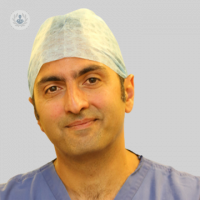Ask an expert: what are cataracts?
Written by:Cataracts are a very common eye problem, which many patients experience later in life. Leading consultant ophthalmic surgeon Mr Shahram Kashani explains everything you need to know about the condition.
What are cataracts and how do they form in the eyes?
The natural lens of the eye is normally clear due to the specific arrangement of the cells that make up the lens. Cataract is the medical term given when the natural lens becomes cloudy as a result of changes in its structure. In the majority of cases, cataracts form as the result of the natural ageing process. However, in certain situations, cataracts can occur at a much earlier point in life.

What are the risk factors associated with the development of cataracts?
Advancing age is the most common risk factor for cataract formation. Other risk factors are as follows:
- eye trauma
- certain medical conditions (such as diabetes and hypertension)
- using certain medications (e.g. oral steroids)
- smoking
- obesity
- hereditary factors
- inflammatory eye disease
- previous eye surgery
What are the common symptoms of cataracts and how do they affect vision?
A cloudy lens cannot focus light as precisely onto the back of the eye. This gives rise to symptoms such as:
- Reduction in vision (misty/cloudy)
- Glare (from headlights or sunlight) and halos
- Reduced hue and quality of colours
- Reduction in contrast sensitivity
- Frequent changes in your spectacle prescription
Can cataracts be prevented? How are they treated?
Sadly, there is no way of preventing cataract formation due to the ageing process. Controlling some of the risk factors mentioned above may slow down how quickly a cataract develops.
The only way to treat cataracts is surgery, which is curative. Cataract surgery is the most common elective surgical procedure in the UK. The surgery involves extraction of the natural cloudy lens (cataract) and the insertion of a new, clear artificial lens which will stay in the eye permanently, for life. It has an extremely high success rate as a result of advances in technology.
How is the diagnosis of cataracts made by an eye care professional?
At the appointment, the ophthalmologist will request a thorough history from the patient. This will be obtained including evaluation of symptoms and previous medical history as well as previous eye problems and treatments. Following this, a full eye examination will be performed with dilating eye drops, which will help the ophthalmologist to check the state of the cataract.
The professional will perform various scans in order to obtain all the information needed to best inform patients about the presence of any other eye problems.
Collecting this information will also help to inform the patient of what to expect afterwards with regard to the resolution of symptoms and the chance of independence from spectacles.
If you are concerned about vision problems and would like to book an appointment with Mr Kashani, do not hesitate to do so by visiting his Top Doctors profile today.


